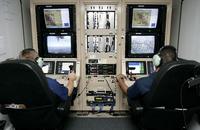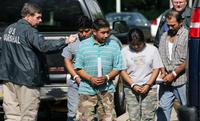-
Tamerlan Tsarnaev's name was on U.S. terror watchlist since 2011

In March 2011, after being contacted by the Russian security services, the CIA added the name of Tamerlan Tsarnaev to the U.S. government’s terror watchlist. DHS secretary Janet Napolitano said that Tamerlan’s travel to Dagestan, and his arrival back in the United States, were “pinged” by the department. Leading lawmakers have raised questions about whether the U.S. intelligence community and law enforcement agencies have dropped the ball on the Tsarnaev brothers.
-
-
Critics say drones make little contribution to border security

A new report says that U.S. Customs and Border Protection (CBP) drones are a wasteful giveaway to defense contractors and a threat to civil liberties. The report cites CBP own figures, the contribution drones make to border security is minimal. According to CBP calculations, drones have played a role in only 0.003 percent in drug seizure and 0.001 percent in illegal border crossing apprehensions.
-
-
Dzhokhar Tsarnaev had no firearms, explosives with him when captured
More details have emerged to shed light on the last few hours before 19-year old Dzhokhar Tsarnaev was captured hiding on a boat in Watertown, Massachusetts. Tsarnaev had no weapons or explosives with him in the boat where he was hiding. Boston police officers say that the heavy fire directed at the boat was probably the result of chaos of the moment. In a tense and charged atmosphere, one accidental shot could have caused what police call “contagious fire.” Tsarnaev sustained severe injuries, some of them to his neck and lower jaw, preventing him from talking. This led to rumors in the press that he tried to take his own life, but failed. We now know that he could not have tried to take his life because he had no firearms with him on the boat.
-
-
Deportations go on while immigration reform debate continues

The Obama administration has continued to deport illegal immigrants even as the fight over immigration reform goes on. President Obama has said his administration will not stop deportation orders until immigration reform has been passed, but immigration reform advocates say the administration should stop deporting immigrants who would be eligible for the path to citizenship under the terms of the Gang of Eight immigration overhaul bill.
-
-
Akron University professor teaches students on how to spot terrorist plots
Professor David Licate, a professor at the University of Akron, wants his students to be aware of those who may be buying bomb-making materials. In his class last Friday, Licate stressed to his homeland security course students that the community needs to look out for warning signs or suspicious behavior in an effort to prevent future tragedies.
-
-
Lawmakers want to learn more about the 2011 FBI investigation of Tamerlan Tsarnaev

Representative Michael McCaul (R-Texas), chairman of the House Homeland Security Committee, and Representative Peter King (R-New York), the former chairman of the committee, sent a letter to FBI director Robert Mueller and Attorney General Eric Holder, seeking answers about the Tamerlan Tsarnaev investigation by the FBI.In 2011, Russian security authorities requested that the FBI question Tsarnaev on suspicion that he was affiliated with Islamic Chechen insurgents, but after interviewing Tsarnaev and doing a background check, the FBI concluded there was not enough to justify continuing tracking of cTamerlan.
-
-
FBI releases images of bombing suspects
The FBI yesterday released videos and photographs of two young men, saying both are suspects in the Boston Marathon bombings. The agency warned that the two suspects should be regarded as armed and dangerous. The FBI was also analyzing cellphone tower records to identify positive hits for signs of calls which may have been placed to trigger both explosions remotely. Investigators are also interested in a battery believed to be used in one of the bombs. The battery was likely purchased with a remote control toy and then extracted so it could be used in the bomb. That could potentially make it easier to zero in on a suspect.
-
-
DHS cuts funds for programs aiming to prevent a McVeigh-like fertilizer bombing attacks

Timothy McVeigh used two tons of fertilizer and $3,000 of racing fuel to detonate a bomb outside the Alfred Murrah Federal Building in Oklahoma City in 1995. The blast killed 168 people. The Obama administration is currently not allocating money or resources to preventing fertilizer bombing attacks like the one McVeigh used, according to a former DHS official with direct knowledge of the department’s budgeting and operations.
-
-
Wife of former judge accuses husband of Texas prosecutor killings
The investigation into the murders of two prosecutors in Texas has taken a strange twist. The wife of a former justice of the peace has come forward, admitting she was involved in the murders of Mike McLelland, his wife Cynthia McLelland, and Mark Hasse, who worked in McLelland’s office.
-
-
Ease of construction makes pressure-cooker bombs popular among terrorists

The ease of building pressure-cooker bombs has made them popular among terrorist organizations and insurgent groups. Inspire, the on-line English-language magazine published by Al Qaeda in the Arabian Peninsula (AQAP), three years ago published an article titled “How to Make a Bomb in the Kitchen of Your Mom” by “the AQ Chef,” which contained detailed instructions on building a pressure-cooker bomb.
-
-
DHS formula grants to states drop dramatically
DHS money allocation o money to states for first response and disaster recovery has dropped significantly. DHS formula grant program was at an all-time high of $2 billion in 2003, but last year the program had only $294 million. As a result of the sequester, another 5 percent will be cut from the program.
-
-
Bombs kill 2, injure 23 at Boston Marathon
Two loud explosions near the finish-line of the Boston Marathon killed two people and injured twenty-three this afternoon. The two blasts occurred after about half the runners taking part in the marathon had already crossed the finish line. Thousands of runners were still heading toward the finish line, but race organizers halted the race within minutes after the explosions.
-
-
Large DHS ammunition purchase continues to be a topic of debate

Conservative lawmakers and commentators continue to question why DHS is purchasing 1.6 billion rounds of ammunition, and will the agency do with so many bullets. DHS says it is cheaper to buy things in bulk, and that the rounds will be used in target practice and training for government agencies’ employees.
-
-
ATF: store which sold guns to Lanza’s mother committed more than 500 firearm violations

The Bureau of Alcohol, Tobacco, Firearms and Explosives (ATF) found that the gun store which sold the mother of Adam Lanza the guns he used to carry out the Sandy Hook Elementary massacre, had been cited for more than 500 violations of federal firearms laws and regulations. The store’s license has now been revoked.
-
-
Canada’s crime-rate calculation method significantly underestimates actual crime numbers
The government of Canada is using a method called “capping” to measure crime in Canada. Capping is a common methodological practice used in most victimization surveys. Researchers find, however, that the technique significantly underestimates the number of crimes — especially the violent kinds — that occur in Canada.
-
More headlines
The long view
How Male Grievance Fuels Radicalization and Extremist Violence
Social extremism is evolving in reach and form. While traditional racial supremacy ideologies remain, contemporary movements are now often fueled by something more personal and emotionally resonant: male grievance.
